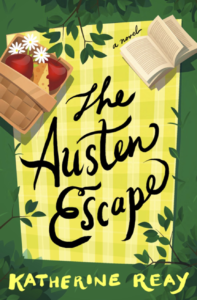INPSY winner Katherine Reay has just released her new novel, The Austen Escape (Thomas Nelson). After years of following her best friend’s lead, Mary Davies finds her future changed forever after a whimsical trip back to Jane Austen’s Regency England. In this exclusive interview, Reay discusses her admiration for Austen’s work, the inspiration behind The Austen Escape, and how the story’s main characters challenged her…
What fascinates you about Jane Austen’s work and the Regency era?
I think Austen was brilliant. One may like her writing or not enjoy it at all, but there is an undeniable brilliance to her work. She pinpoints human nature with unerring accuracy and gets to the measure of a person in a single line. Consider Darcy’s statement in Pride and Prejudice: “I was given good principles, but left to follow them in pride and conceit…” She lays out, on deep level, Darcy’s childhood and perception of his place in the world. Or take a look at Austen’s opening to Persuasion: “Vanity was the beginning and the end of Sir Walter Elliot.” She summed up that poor man in single sentence.
 In fact, Austen’s writings remain so influential that a 2013 study found her works to have the greatest influence on modern authors, and another study found her word choice to be outside the general selection used in literature during her lifetime and in ours. She wrote in gradations, often employing words like very, muchly, and most. We aren’t trained to write that way, but we do think that way. We often think in comparisons, even subconscious ones. I also love how she moves her characters through their story. Seismic shifts happen in small spaces. All in all … brilliant.
In fact, Austen’s writings remain so influential that a 2013 study found her works to have the greatest influence on modern authors, and another study found her word choice to be outside the general selection used in literature during her lifetime and in ours. She wrote in gradations, often employing words like very, muchly, and most. We aren’t trained to write that way, but we do think that way. We often think in comparisons, even subconscious ones. I also love how she moves her characters through their story. Seismic shifts happen in small spaces. All in all … brilliant.
You ask about the Regency era too … Oddly, the Regency era has not gripped me as it has captivated others. Austen wrote contemporary novels, examining the culture and socio-political landscape around her. I like thinking of her novels in that context and only turned to the Regency era as the ideal form of escape for Mary and Isabel. I also loved how transitioning these two women to that era played into our modern appropriation of Austen and the world in which she lived.
What inspired the story in The Austen Escape?
Inspiration from The Austen Escape came from many places. One primary source was a C.S. Lewis novel and the other was a nonfiction book positing on how we become our best selves. The latter book was a mathematical study of Christianity’s growth worldwide and the unique set of attributes of those who said they were most fulfilled in their faith. It started me thinking about what a search for one’s “best self” might look like. How do we become our best selves? Mary emerged in my imagination as a young woman who had so much going for her, yet had allowed others to define her—and yet there was something more, something new, in store for her if she could just reach for it. And once I had Mary, Isabel soon followed….
How is The Austen Escape similar to or different from your previous work?
The Austen Escape, for me, is the capstone for my first five novels. Each is a unique story with no crossover, but—as I say—they sit well on a shelf together. They all make overt allusions to classic literature as a common language, both between the characters and between the book and the reader.
My next novel’s heroines will be a little older (though not older than The Bronte Plot’s 85-year-old Helen) and there will be more subtle literary references. I’m excited for the next phase and so delighted that The Austen Escape provides a wonderful conclusion to the first.
What was the most challenging part of writing this story?
Isabel. She has such depth to her and a complexity that I had to lay out without letting her steal Mary’s show. You want to dislike her—and she deserves your ire. She does some horrible stuff to Mary, her supposed best friend. But she’s so hurt and so vulnerable, that you begin to understand why Mary makes allowances for her and why you, the reader, need to as well. And yet…. She too must take responsibility and step out of old patterns if she’s to find her “best self.”
What do you hope readers will take away after reading The Austen Escape?
The story presents a fun fresh way to look at one’s woman journey for self-definition, love, and her best future—with lots of winks to classic literature and Dr. Seuss. My hope is that within this fun atmosphere, readers to find a sense of hope and an excitement for what may lay ahead for them. I think we often let outsiders—work, friends, family, history, and experiences—define us. But “something new” is waiting if we have the courage to leap.
I also hope readers enjoy a journey outside their own lives and their own towns—to come away, as if from a lovely vacation, fully believing that one such as Mary exists and that an imaginary visit to Regency England was just the thing to do for a few hours.


